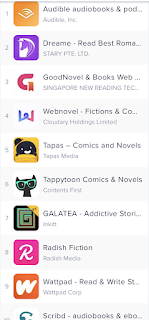huh?
Why oh why can't we have a better press corp? Saw this article on amazon and books and how it had changed everything and I wondered if it was, perhaps, going to provide some insight. Thing is, I have a couple odd issues with the same old Amazon tales told and would like to see more numbers [1].
But this article isn't that. Again, it rarely stated what evidence showed that Amazon was taking over the entire reading market (let's think of fiction market alone, nevermind fake news etc[2]) and simply thought in terms of books and ebooks. Fair enough. It has a decent amount of interesting takes (it's a review of a book, fyi) about the plethora of new genres that kindle has allowed to grow because of the way it feeds customers exactly what they want.
 Highest Grossing Book Apps
Highest Grossing Book Apps
But what about the other markets of webnovels and what have you? Once again, there is little being done to actually see what all these apps are bringing in and comparing that to what the novel/ebook world looks like. Even if we're to look away from these other forms of writing (also a continuous stream of chapters, always hooking the reader, and many times with erotica as a selling point), the article at no point gives numbers for how much of the market Amazon now accounts for (and how much of, say, ebooks sold by them are from publishing houses, so the profits are split... etc etc).
No, only one semi-stat is sputtered and it does little to edify a damn thing, while only barely supported the narrative.
Again, why is this so hard to find and write up? There's a story going on out there about openly fictional narratives [3] and how the internet has affected that but dammit it all if I haven't read or heard about it just yet.
[1] One is that Amazon took out bookstores. Last I checked, about 5-10 years ago, it was Border and B&N that took out your brick and mortar stores. Then Amazon took these behemoths out. I was also under the impression that independent bookstores (who knows with covid now) were on the rise after the fall of B&N et al. But, again, no one has ever stated otherwise with actual numbers to back their stories up.
[2] These other forms of fictional narratives don't always present themselves as fiction {1} and so for this argument, for now, I'll {1} the quintessential, and perhaps edgy reply to "most popular/influential American fiction" is usually Book of Mormon, and though it's true, it's sold as non-fiction so outside the purview of the above article and most discussions.
[3] And one about fictional narratives dressed as the real as well, but that's for another day. Also, note I found that 3 years ago Wattpad (9th on this list) was a 400M$ company. Whatever that means.
Enjoyed it? Share it via email, facebook, twitter, or one of the buttons below (or through some other method you prefer). Thank you! As always, here's the tip jar. paypal.me/nlowhim Throw some change in there & help cover the costs of running this thing. You can use paypal or a credit card.

But this article isn't that. Again, it rarely stated what evidence showed that Amazon was taking over the entire reading market (let's think of fiction market alone, nevermind fake news etc[2]) and simply thought in terms of books and ebooks. Fair enough. It has a decent amount of interesting takes (it's a review of a book, fyi) about the plethora of new genres that kindle has allowed to grow because of the way it feeds customers exactly what they want.
 Highest Grossing Book Apps
Highest Grossing Book AppsBut what about the other markets of webnovels and what have you? Once again, there is little being done to actually see what all these apps are bringing in and comparing that to what the novel/ebook world looks like. Even if we're to look away from these other forms of writing (also a continuous stream of chapters, always hooking the reader, and many times with erotica as a selling point), the article at no point gives numbers for how much of the market Amazon now accounts for (and how much of, say, ebooks sold by them are from publishing houses, so the profits are split... etc etc).
No, only one semi-stat is sputtered and it does little to edify a damn thing, while only barely supported the narrative.
Again, why is this so hard to find and write up? There's a story going on out there about openly fictional narratives [3] and how the internet has affected that but dammit it all if I haven't read or heard about it just yet.
[1] One is that Amazon took out bookstores. Last I checked, about 5-10 years ago, it was Border and B&N that took out your brick and mortar stores. Then Amazon took these behemoths out. I was also under the impression that independent bookstores (who knows with covid now) were on the rise after the fall of B&N et al. But, again, no one has ever stated otherwise with actual numbers to back their stories up.
[2] These other forms of fictional narratives don't always present themselves as fiction {1} and so for this argument, for now, I'll {1} the quintessential, and perhaps edgy reply to "most popular/influential American fiction" is usually Book of Mormon, and though it's true, it's sold as non-fiction so outside the purview of the above article and most discussions.
[3] And one about fictional narratives dressed as the real as well, but that's for another day. Also, note I found that 3 years ago Wattpad (9th on this list) was a 400M$ company. Whatever that means.
Enjoyed it? Share it via email, facebook, twitter, or one of the buttons below (or through some other method you prefer). Thank you! As always, here's the tip jar. paypal.me/nlowhim Throw some change in there & help cover the costs of running this thing. You can use paypal or a credit card.


Published on October 27, 2021 23:25
No comments have been added yet.
Nelson Lowhim's Blog
- Nelson Lowhim's profile
- 14 followers
Nelson Lowhim isn't a Goodreads Author
(yet),
but they
do have a blog,
so here are some recent posts imported from
their feed.



